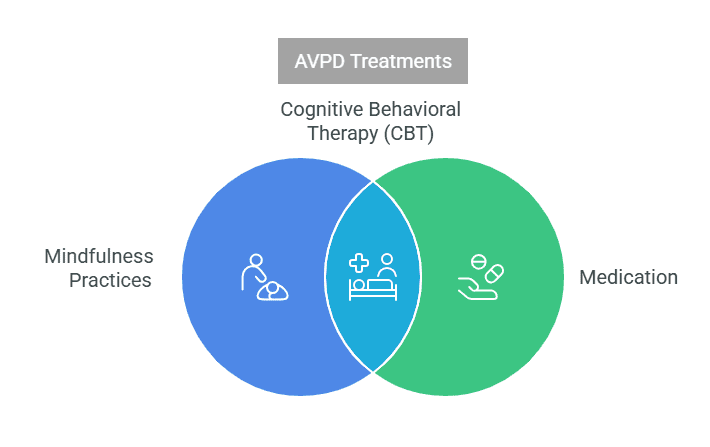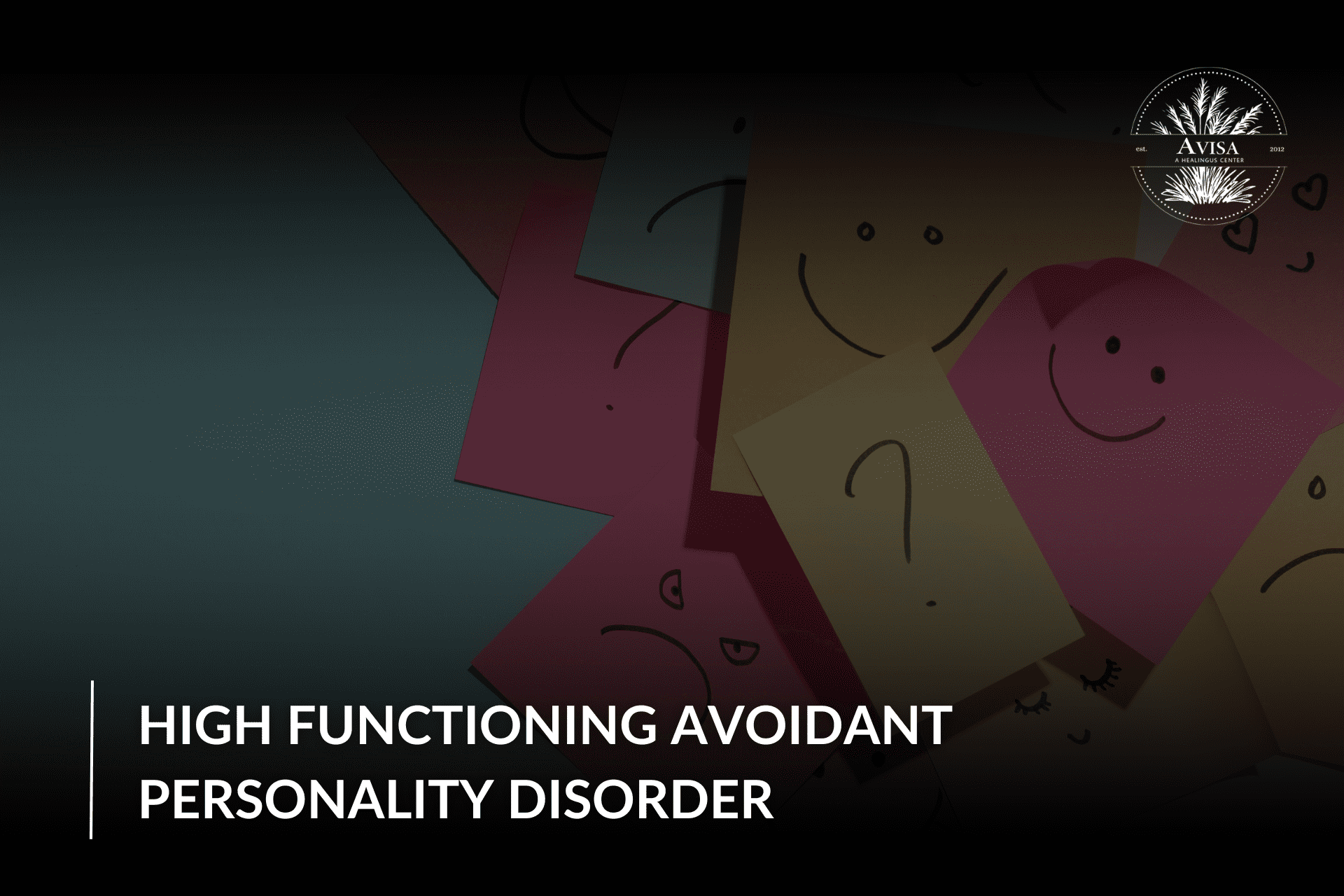One type of Avoidant Personality Disorder is called High Functioning Avoidant Personality Disorder (AVPD). Such conditions can be difficult to diagnose and treat. While this condition is less severe than the other forms of the disorder, a person diagnosed with high-functioning AVPD would still be able to go through their daily activities, albeit with constant internal struggles. Such persons complain of symptoms of AVPD but are typically high functioning, meaning they have normal employment and social engagement, so this article will discuss what high-functioning AVPD is and its causes, symptoms, and treatment.
Living with constant internal battles?
Understanding High Functioning Avoidant Personality Disorder
High Functioning Avoidant Personality Disorder is a subtype of Avoidant Personality Disorder (AVPD) in which patients meet the clinical criteria for many aspects of APD but not all and are still able to function. They can manage to hold down jobs and keep relationships but, underneath all else, feel very tight feelings of being rejected, unworthy, or unable to meet expectations. Such patients may seem sociable and productive but may suffer from high self-hate, anxiety, or social phobia, which manifests itself in their subconscious.
The everyday encounters of individuals with high-functioning AVPD, as well as their views towards themselves, are particularly difficult. For example, socially avoidant individuals with high-functioning AVPD may not be as handicapped in their daily activities as others suffering from the more severe forms of AVPD.
What Causes Avoidant Personality Disorder?

There is no definitive understanding of the occurrence of Avoidant Personality Disorder. AVPD, high functioning included, has not been fully documented. Nevertheless, there are various factors that are believed to cause it:
Genetic Predisposition
This is more than a mere psychological disorder, as AVPD may have a family history. A history of anxiety and personality disorders within the family may increase risk factors.
- Family History: A biological predisposition to stress-related disorders and psychiatric problems may occur.
- Inherited Traits: There are specific traits of personality, especially those with AVPD, that are largely acquired.
Environmental Factors
Long-term overbearing parenting and critical upbringing are two childhood factors that can actively help contour the avoidant characteristics. Inadequate nurturing and protection amongst more chilly young people, who are exposed to teasing, leads them to confinement.
- Parental Influence: Overprotective or overly critical parents can and do affect self-confidence gauges negatively.
- Traumatic Experiences: Being faced with too many aversive events as the child grows can, over time, bring out avoidant behaviors.
Neurobiological Factors
Brain biochemistry and Brain functioning variations are other retained causes of AVPD. Research studies that have examined the brain imaging of people with personality disorders have reported structural and functional deficits, including in brain regions.
- Brain Chemistry: The disparity of neuromodulators is simply avoidable through further clinical proofs and or biological changes.
- Brain Activity: Changes in brain functioning may influence stress responses and social behaviors in an individual.
These possible risk factors suggest a way forward in designing and implementing specific measures of support for individuals with high-functioning AVPD.
Symptoms of High Functioning Avoidant Personality Disorder
Different kinds of symptoms represent this particular type of functional or high-functioning avoidant personality disorder. The symptoms will vary in intensity, but at the core, the following are the common symptoms:
Low Self-Confidence
In general, those who function highly with AVPD often tend to hold within themselves feelings of unduly inferiority as well as insecurity. To such individuals’ levels of professional or personal achievements are simply immaterial since they regard every work done as substandard and unworthy of accolades.
- Fear of Unmasking: It is the fear of someone taking away the mask and discovering the true person: the pdf.
- Imposter Syndrome: Even great results may seem low and unworthy, and seeking high self-gratification may feel impossible.
Due to high-functioning AVPD, there is fear of being exposed and consequently not fulfilling one’s projected self-concept and level of performance. This feeling of inadequacy can be detrimental to self-worth and mental health in general as one becomes persistently anxious about social situations and the ability to cope in such interactions.
Self-Isolation
Among the commonly observed traits of high-functioning AVPD is the inability to stay in a social situation. Therefore, a person may avoid the social environment, such as parties and even relationships, out of fear of rejection.
- Avoidance of Social Events: It is common to consider social events to be highly dangerous or socially awkward.
- Limited Social Circle: People may not seek to have many caregivers in a controlled manner as a means of reducing risks.
This self-isolation can result in feelings of loneliness and further exacerbate the sense of inadequacy. Avoiding social interactions is a coping mechanism to prevent potential humiliation or discomfort.
Hypersensitivity:
High-functioning AVPD presents individuals with slight tolerance to cutting remarks and any form of perceived disregard. In this state, one may worry too much about socializing and about what other people think of them.
- Over-Analysis: This involves stressing oneself too much through analyzing social interactions to search for hidden messages or underlying prejudices.
- Emotional Reactivity: Hurt, even slight, can manifest through emotional tears or anger.
This sensitivity can trigger overwhelming feelings and excessive vulnerability. There is such a thing as fear of people’s feedback.
AVPD Treatments

In the case of high-functioning AVPD patients, management involves a very integrative management approach comprising therapy, drugs, and digging. Primary and secondary interventions enhance symptom relief and quality of life improvement.
Cognitive Behavioral Therapy (CBT)
CBT is the most common and efficient management strategy for people who have high-functioning AVPD. This therapeutic strategy involves the identification and modification of detrimental attitudes and behaviors.
- Thought Restructuring: CBT helps in the reframing and detaching from the disturbed and hostile layouts of thinking.
- Behavioral Experiments: This includes practicing real-life situations that can inspire an individual to avoid certain situations.
CBT allows people with high-functioning AVPD to learn to change their thought processes and attitudes, find positive avoidance rather than withdrawal strategies, and eventually confront their fears. The aim here is to stop this reinforcement of avoidance and improve self-efficacy and adaptability.
Medication
There are no medicines aimed at treating AVPD. However, several medications can be prescribed to treat chronic anxiety and depression that often accompany high-functioning AVPD but do not necessarily target the AVPD.
- Antidepressants: These will help relieve depression and anxiety in the patients.
- Anti-Anxiety Medications: They are employed to control situational panic attacks.
Medication alone has been found to work well for symptom relief, but improvement in all symptoms is best when combined with other forms of treatment.
Mindfulness Practices
Mindfulness practices such as meditation and deep breathing exercises can be effective when working with the high-functioning AVPD group. Such techniques enhance self-awareness, calm the body and mind, and efficiently manage emotions.
- Meditation: Assists a lot in bettering one’s center and pacifying their thoughts.
- Deep Breathing: A tool one uses to lower levels of anxiety and stress.
People also benefit from mindfulness techniques, as these can help them overcome anxiety and thus enhance a positive self-image. They are able to detach from their emotions and thoughts instead of being consumed by them.
Tired of fighting addiction and mental health struggles?
Ignoring both deepens the struggle. Our holistic approach—detox, therapy, and medication-assisted treatment—can help you heal. Take the first step today.
FAQs
Q: What are the 7 traits of avoidant personality disorder?
A: Avoidant Personality Disorder is composed of adaptability, fear of social contact and actions engaging fright of embarrassment, sense of being unworthy, social phobia, anxiety in relation to negative feedback, and even in forming and keeping close ties with anyone.
Q: What are the 3 symptoms of avoidant personality disorder?
A: The three associated symptoms of Avoidant Personality Disorder include feelings of invisibility, feeling disproportionately affected by embarrassing or critical remarks, and consequently avoiding any form of social interaction due to a concern about negative outcomes.
Q: How do you spot someone with a high-functioning avoidant personality disorder?
A: When studying avoidant personality tendencies, the following general traits of high-functioning Avoidant Personality Disorder can be observed: prolonged periods of social withdrawal and avoidance reactions, chronic feelings of inadequacy, lack of courage, and other crewmates or localities.
Q: What is it like to have a spouse with an avoidant personality disorder?
A: Having as a spouse someone with Avoidant Personality Disorder has its own difficulties where, for instance, emotional closeness is hard to achieve, there are regular fights owing to her partner’s preference of avoiding getting into confrontations, difficulty in essaying the role of a support system and providing emotional assistance to the partner or even listening to her concerns and fears.
Conclusion
It is important to understand trends among patients with high-functioning Avoidant Personality Disorder in order to offer them effective assistance and treatment. Because there are treatments and cortical problems, people can better treat their difficulties and develop ways to change their lives better.
Persons suffering from high-functioning AVPD can make use of such treatments as Cognitive Behavioral therapy alongside appropriate medication and practice of mindfulness to relieve their symptoms of the condition for a meaningful life.
If you or a loved one are affected by high functioning Avoidant Personality Disorder, help and treatment are available for you. Seek assistance and take the first step toward a positive shift in your life with Avisa.











